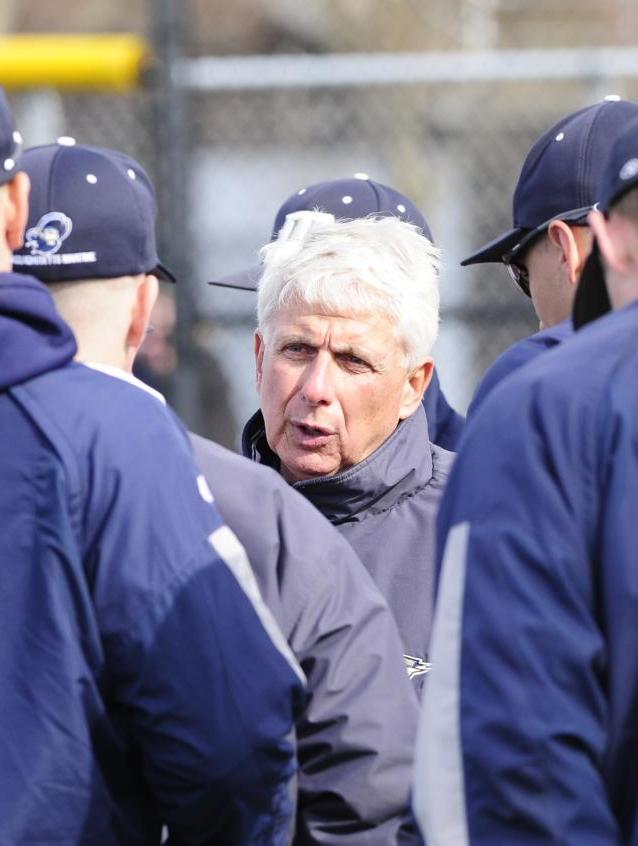
For Pride, For Passion, For Love Of The Game: Celebrating 40 Seasons With Coach C
For Pride, For Passion, For Love Of The Game:
Celebrating 40 Seasons With Coach C
Though seemingly timeless, thanks to the lack of constraint provided by a mere clock, baseball, like winter, spring, summer and fall, is still a season. It touches our senses in a way that no other sport can—it is indelibly wrapped into the fabric of our lives and crafts a hallowed place in our souls. No matter the venue, baseball requires, more so demands, our full attention while it performs a most memorable nine-act play that more often than not provides drama, excitement and surprise when the curtain goes down.
As meteorological seasons change, so to do baseball seasons. Players come, players go. Memories are made and treasured even as new memories are made. Stories are told and legends grow. Like an artist’s canvas, the picture is first blank and then filled with great color—until a new canvas is ready to be drawn.
The fickle winds that sweep across the inlet known as Taylor’s Point have whistled in new faces for many a generation at the Massachusetts Maritime Academy, but one iconic mug has greeted countless groups of fuzzy faced cadets for 40 years. He can be salty as the ocean that surrounds his beloved Commodore Hendy Field—he can even be moving in more directions than the wind itself. But to those who have played for him, worked with him or have engaged him, he goes by a name that everyone knows:
Coach C.
Bob Corradi began his journey at the Academy at a time when Richard Nixon was still a popular President. He moved slightly North—from Falmouth to Buzzards Bay—in 1973 to build a program to call his own. His players would be charged with doing three things, and three things only, if they were going to call themselves Buccaneers: respect your teammates, respect the game and represent your school with pride. If you couldn’t do that, you weren’t going to last very long. And if you could, the gift you received in turn was priceless—you just didn’t become a player, you became a man.
It took two short years for Coach C to turn his Buccaneers into winners. From four victories in that opening 1973 campaign, Corradi guided his crew to 17 wins in the spring of 1975. And three years after that, a string of six straight 20-plus win seasons ensued, capped by a school record 28-11-1 mark in 1982 that gave the Academy its first conference title. A start-up to a conference champion in less than 10 years—that definitely deserves an “Oh my”!
He’s had all kinds in his program—bashers, singles hitters, fireballers and specialists. But the common thread that Corradi instilled then and continues to instill today? You’d better be ready to play Buc Ball. There might be some who credit Whitey Herzog or Tony LaRussa with creating what we call today “small ball” or “situational baseball”, but ask anyone who has seen or played against a Bob Corradi team, and they will tell you that he perfected it. Suicide squeeze in an unorthodox situation? Keeps the other team on their toes, says Coach C. Going against the book on a lefty-right match-up? I read the book—it wasn’t that good, he’ll say—I’ll write my own book. And undoubtedly, it has been a page turner for four glorious decades.
The winds of change blew once again across the Academy in the early 80’s when Massachusetts Maritime’s academic calendar shifted the annual Sea Term semester from late spring to early winter, meaning that baseball, like all other sports, would lose practice time and see its schedule change. Corradi embraced the change and tackled all of the challenges that came with it, because as he tells all of his players, meeting the challenges of baseball will help you meet the challenges of life.
Yes, the win totals dropped, but the lessons learned increased—integrity, determination and inspiration are synonymous with Bob Corradi’s character. There’s no feeling sorry for yourself, young man, if you can’t handle the pressure of this situation on a baseball diamond, how do you expect to handle a life-and-death crisis you may face in the middle of the ocean? You want philosophy—the greatest teachers and philosophers in the world could learn a lesson from Coach C. Bob Corradi doesn’t have duende—duende has Bob Corradi.
Baseball is known for creating memories and milestones, and there have been plenty of both during Coach C’s tenure on Taylor’s Point, the most recent coming in April of 2009 when he became the 30th active coach in NCAA Division III play to reach the 500 victory plateau. He may not remember each of his triumphs on the diamond, but more important than recording a result, he remembers every one of his players that was in uniform for those wins. To this day, he can tell you which of his alumni wore what number when they played—all, of course, except the dreaded “12 plus 1”, which no one has or ever will don in his presence.
Seasons have come and seasons have gone since that first spring in 1973, but the winds of change have been unable to sweep away the man from the sea, and countless individuals who came to Massachusetts Maritime as young men looking to be educated and enlightened have left the Academy as better people after being molded by a great sculptor in Bob Corradi. Longevity in college athletics these days is marked sometimes in months, maybe in short years, but certainly not in decades. He is passionate, poetic, sometimes prophetic and dare say heroic in his actions. He is a devoted husband, a loving father and a doting grandfather. He is as solid as the rocks along the shoreline that straddles the outfield of his beloved ballpark, and he will forever be synonymous with one lasting gift that he brings to us all:
Buccaneer Pride.



















